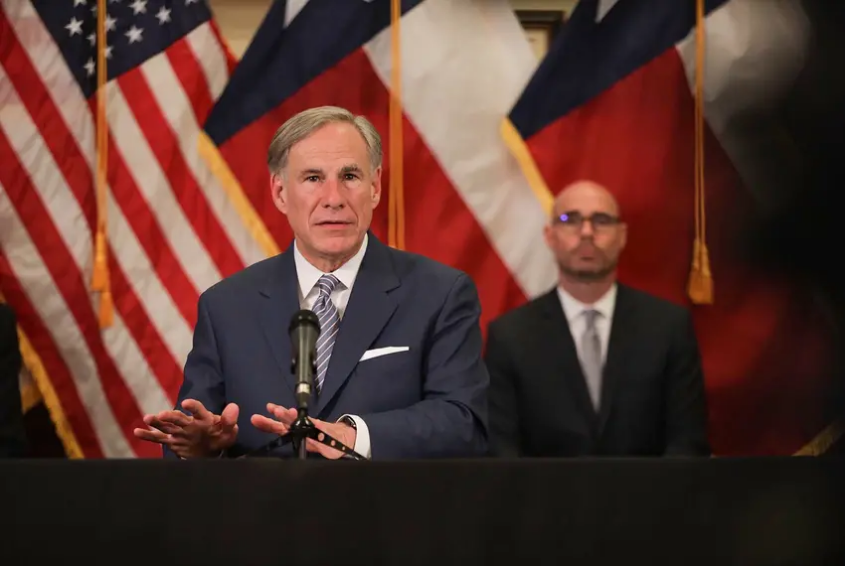If a business reopens and an employee chooses not to return to work, they become ineligible for unemployment, according to the Texas Workforce Commission.
Gov. Greg Abbott’s Monday announcement that retail stores, restaurants, movie theaters and malls will be allowed to reopen Friday means many Texas workers now have a difficult decision to make.
Going back to work means earning a paycheck again, but it also can increase their risk of exposure to the novel coronavirus, which has already infected more than 25,000 Texans and left 663 dead. And refusing to return after a business reopens means forfeiting unemployment benefits.
“I feel like either I’m going to lose my business and everything I worked for,” said Kimberly West, owner of Joe’s Pizza and Pasta in Victoria, “or I’m going to get sick.”
A self-identified “germaphobe,” West said she isn’t worried about following the new state requirements that restaurants seat parties at least 6 feet apart and have a hand sanitizing station at their entrance. West said she already had her hostesses wipe down the menus daily to clean them.
But because many of her workers are receiving unemployment payments that are more than a typical paycheck at the restaurant, West said she’s worried that her employees won’t come back to work.
One of the qualifications for unemployment benefits is that workers must be “willing and able to work all the days and hours required for the type of work you are seeking,” according to the Texas Workforce Commission.
Those who choose not to return become ineligible for unemployment benefits, said Cisco Gamez, a Texas Workforce Commission spokesman. If workers have concerns about whether their employer is following health guidelines, Gamez said they should contact the U.S. Occupational Health and Safety Administration.
A waitress who works at Big Daddy’s restaurant in Odessa found herself asking these questions after being called in to help paint and deep clean the restaurant when it reopened for takeout orders. The waitress — who requested anonymity because she fears losing her job — said no social distancing measures were implemented and she felt she was being put at risk.
“It scared me, so I left,” the waitress said. “Then I had to remember that if I do quit, I would have to lose my unemployment. I had to stay in a place I really didn’t want to work at to get unemployment.”
She said she’s now working a few hours a day because she needs the income as a single mother. And with the restaurant planning to reopen Friday, she said she doesn’t have much of a choice about going back to work full time.
“I know things need to start opening, but I don’t really know,” she said. “I’m going to be wary, cautious.”
People with underlying health conditions and those over age 65 face increased risks if they are exposed to COVID-19, the disease caused by the novel coronavirus. Abbott’s office did not immediately respond to requests for comment on what guidance his office will give to businesses to take into account the safety of high-risk workers.
Rick Levy, president of the Texas AFL-CIO, told The Texas Tribune that high-risk workers “shouldn’t be forced to work” if their employers aren’t following proper health guidelines. Levy said he doesn’t believe OSHA has the bandwidth to inspect every business if there’s a surge of worker complaints.
The report issued by Abbott’s office about reopening also falls short of providing workers with the resources they need, Levy said.
“It makes me so mad that [the governor’s office] talks about, ‘If workers aren’t feeling good, they should stay home,’” Levy said. “That would be a lot easier to do if you had sick-leave benefits, but the state has consistently refused to provide any paid leave at all.”
Davin Hohhertz has been working as a server at Joe’s Crab Shack on the San Antonio Riverwalk for about three years and was furloughed in March. He said all of his $1,200 stimulus money went toward child support, as does a significant chunk of his unemployment payments.
In the meantime, he’s been donating plasma to make ends meet, making $320 this month doing so. Hohhertz said he plans on returning to work as soon as he’s able — but with that comes the fear of exposure.
“There’s a little bit of fear as people come in and eat,” Hohhertz said. “And if there’s someone asymptomatic who’s prepping all the crab dip, that could very easily create a new wave, a new hot spot.”
“As businesses prepare to reopen, workers weigh COVID-19 risk against the need for a paycheck” was first published at https://www.texastribune.org/2020/04/27/texas-abbott-reopen-unemployment/ by The Texas Tribune. The Texas Tribune is proud to celebrate 10 years of exceptional journalism for an exceptional state
</div>
</article>
<p>This article originally appeared in <a href="http://www.texastribune.org/">The Texas Tribune</a> at <a href="https://www.texastribune.org/2020/04/27/texas-abbott-reopen-unemployment/">https://www.texastribune.org/2020/04/27/texas-abbott-reopen-unemployment/</a>.</p>
<link rel="canonical" href="https://www.texastribune.org/2020/04/27/texas-abbott-reopen-unemployment/">
<p>The Texas Tribune is proud to celebrate 10 years of exceptional journalism for an exceptional state.
<a href="https://www.texastribune.org/series/10th-anniversary/?utm_campaign=trib-marketing&utm_source=media_partners&utm_medium=website&utm_term=reprint-footer">Explore the next 10 years with us.</a></p>
<script src="https://dot.texastribune.org/static/dist/dot.min.55eef7d282ec435600d1.js" integrity="sha384-kWHbWWrJHsBy04/FLYpSF8whX7iznTaWu7KCwxjA7qmPD3La29VFha61MJDfKQ+e" crossorigin="anonymous" data-tt-canonical="https://www.texastribune.org/2020/04/27/texas-abbott-reopen-unemployment/"></script>
